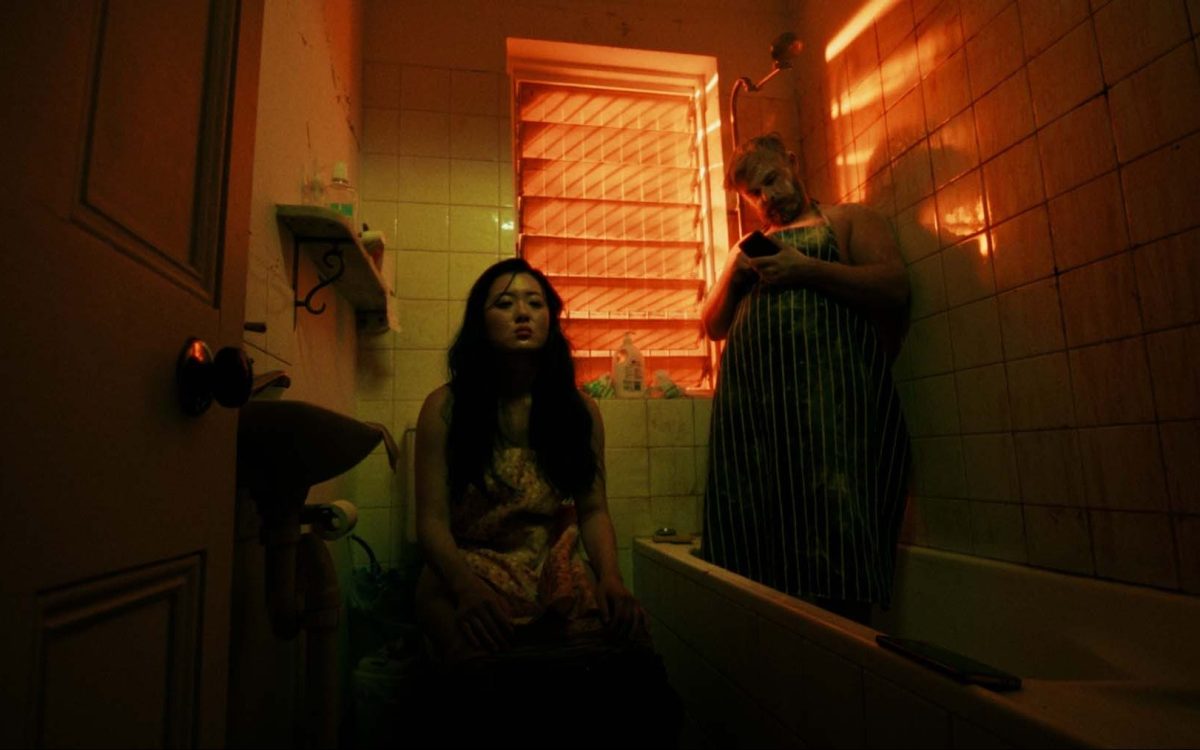Inspired by a ‘weird blend of raunchy Asian food comedies like God of Cookery, Tampopo, Food Wars, Extreme Job and crime thrillers like Pusher and Uncut Gems,’ Sydney-based co-directors, Will Suen and Sejon Im’s newest short film is brilliantly unhinged, brimming with delicious chaos and wild absurdism.
Sweet Juices, which has already garnered awards and accreditations at various local and international film festivals, boldly imagines an anarchic world where food is the reigning currency. In a bid to pay off their accruing debts, two blackmarket chefs deploy their delicious dumplings as a form of bribery to evade the looming threat of eviction and impending incarceration.
‘Having great food and spending time with mates is life’s greatest pleasure. This is ultimately what all the characters in Sweet Juices desperately want,’ Suen says. ‘It’s what I desperately want.’
Suen and Im met, of all places, on Facebook Marketplace. Im explains the origin story of their collaboration: ‘Will wanted to buy some camera gear from me, which led to us going to a pub for some drinks, and from there it was love at first sight.’ He describes their experience co-directing as ‘the biggest gamble’ and ‘best thing to have ever happened’.
‘The way we cooperate now has drastically changed since our first shoot together, where it felt like a three-legged race running in opposite directions. Now we’re fluid as water,’ says Im.
The duo have been described by one of their actors as having ‘cocaine-binge intensity in their approach to framing and editing action’. The riotous aesthetics of Sweet Juices are outrageous while the film remains endearing in its unruliness. When asked about the tone of the film, Suen says it was ‘something we felt instinctively, and I think it comes with going to lots of parties and meeting lots of people. Some people are so charming yet awkward, charismatic yet obnoxious. It’s finding humour in drama, the cesspit of life that makes movies so interesting’.
Im adds, ‘Every now and then, life has these moments where everything seems to go out of control in a “stranger than fiction” sort of way. It’s often through these visceral human experiences you really find out how far you can be pushed before the cracks start forming. Similarly, we wanted to throw our characters into that perfect storm of utter chaos, where they’re pushed further than ever before.’
As part of their creative team, they credit their cinematographer, Benjamin Powell, and art director, Emilie Ziolkowski. Most notably, they applaud the film’s two stars, Anthony Roy Barton and Shirong Wu, who ‘brought their entire souls to the project’. Sejon says, ‘It wasn’t about directing them, it was about not getting in their way.’ Other stellar actors involved in the short film include Christian Byers, Catherine Văn-Davies and Harrison Green.
Wu recounts how the project was ‘dropped in front of my face at the kitchen table by my then-housemate-turned-director Will during lockdown. He wrote it for me and my partner Tony at the time. The characters are named Shirong and Tony. They are exaggerated versions of ourselves’.
Wu, who recently starred in White Pearl (Sydney Theatre Company, 2022) and Miss Peony (Belvoir, 2023), brings a fierce fearlessness to the screen. It is rare to see an Asian-Australian woman cast in such an unflinchingly feral and uncouth light. Her performance is most unforgettable during scenes of obscene excess and abject volatility.
Sweet Juices is unapologetically explicit in its irreverent and hyperbolic humour, from its persistent profanities to revolting projectile kissing. Im says, ‘On a surface level, we found the comedy in the film when it naturally came to us. On a deeper level, maybe we just haven’t fully grown up yet’.
Food: intimacy, memory and power
The desire for mouth-watering and exotic foods in Sweet Juices brings out something animalistic and grotesque in all the characters. Food represents a form of shared intimacy and love, while also exerting a degree of power in its commodification of otherness. This is influenced by the directors’ upbringing and experience growing up as second-generation migrants in Australia.
Suen says, ‘Sweet Juices isn’t just about Chinese food, it’s a celebration of Sydney’s Asian food culture. My family have worked in Chinese restaurants all throughout NSW, so food was always top of mind.
‘I remember as a kid not being able to understand why kids’ TV shows here in Australia kept making fun of Brussels sprouts and broccoli. This was until I got invited over to my best friend’s house for dinner. His name was Sean, and his family was from Mullumbimby. I got served broccoli, and when I put that green cardboard in my mouth, I understood then and there that my family was different. Even as a 10-year-old kid, I knew broccoli needed to be blanched for no longer than two minutes to bring out the sweetness and the crunch.’
Im says, ‘I grew up in a Korean family, so in my adolescence, going to a Chinese restaurant felt like the biggest treat since it didn’t taste like “boring old” food at home. The thing I love about Chinese food is how absolutely saucy everything is. I love sauce.’
Sweet Juices cleverly weaponises its characters’ corrupt greed for food against them, giving otherwise vulnerable characters some leverage. This was loosely based on Suen’s experience growing up with parents who didn’t speak much English. He says: ‘To get anything done in the family, my mum would bring homemade dim sums to accountants, lawyers, buildings – you name it.’
Im explains, ‘Everyone has a “price”, regardless of their background, class, politics etc. In saying that, when we were world-building this film, we wanted to create a city of extremes in the most fun, yet grotty way possible. It would be a city filled with impulse and obsessive fetishes. In Sweet Juices, everyone is stealing and cheating from each other; however, the government are merely the best at doing it.’
The precarious atmosphere of socioeconomic instability in Sweet Juices fuels Shirong and Anthony’s anti-authoritarian desperation, as they face off against a character facetiously called “Constable Cummings”.
Read: Australian Film Festivals Guide 2023
Despite the film’s representation of Asian Australian characters, Im says, ‘It felt right for the story to not be overly motivated by race. One thing we did focus on heavily was to ensure our Asian Australian characters felt real to us.’
When asked about the pressure and responsibility of prioritising representation in the media landscape, one of the producers, Louise Todd-Smith, says, ‘Anything is possible! This idea of “normal” is so overused… The film is based on characters the directors felt were real and diverse enough for the average Asian Australian to experience.’
This push towards creating characters that are not limited to their racial identity is also echoed in Wu’s motivation as an actress when choosing roles. She says, ‘What I’m really interested in is when racial or cultural background is not the locus of attention. When I am able to draw from the full spectrum of my humanity to play a character, that is when it gets really interesting for me’.
Suen continues, ‘Sweet Juices was never meant to be a film about racial identity; it’s a film about a city we love, and the people in it who’ve made us laugh and cry.’ The film came out of Suen and Im’s shared love for Sydney. ‘We’ve lived here our entire lives. Every detail in the film reflects all the stupid s**t that’s made us laugh these past few decades,’ Suen concludes.
Sweet Juices screened at SXSW Sydney as part of Short Nightmares program.
This article is published under the Amplify Collective, an initiative supported by The Walkley Foundation and made possible through funding from the Meta Australian News Fund.





